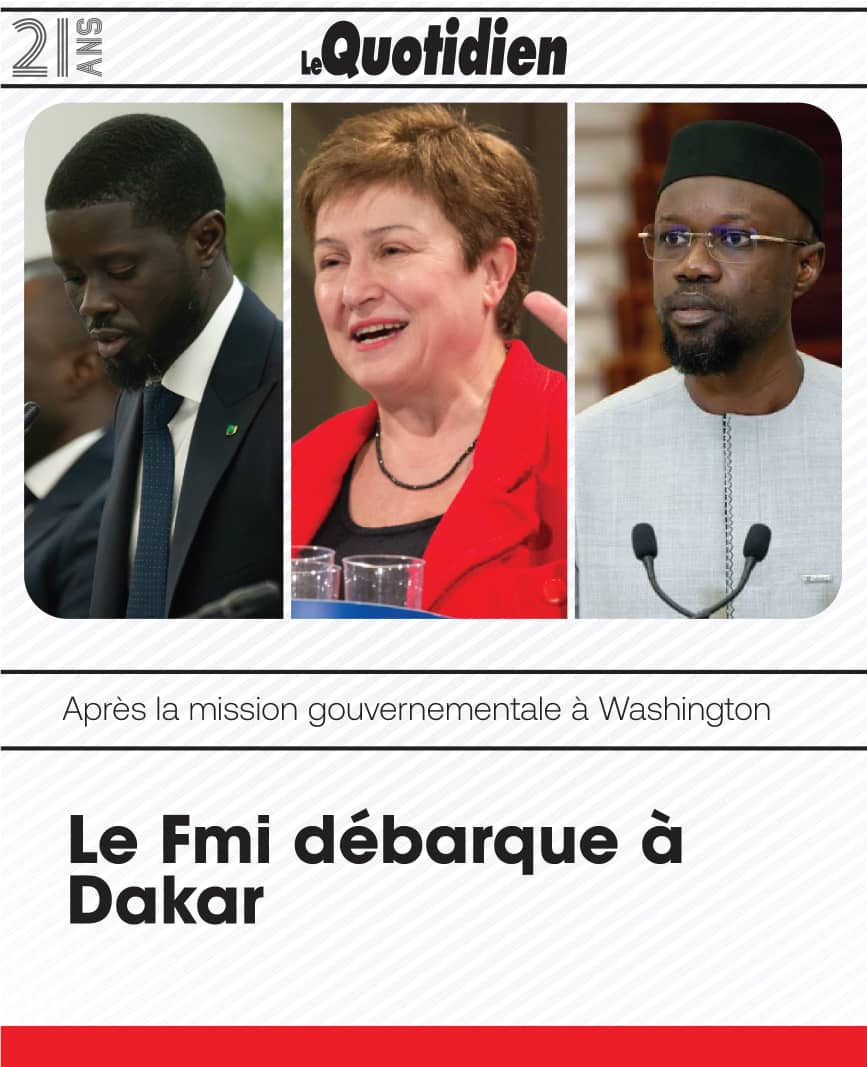Following the Government Mission to Washington: The IMF Arrives in Dakar

Following the Washington trip of the Ministers of Finance and Economy and the Secretary General of the Government, an IMF delegation is arriving in Dakar this Friday to discuss economic and financial policy guidelines with the new authorities.
The International Monetary Fund (IMF) is sending a delegation of experts to spend a week in Senegal. The visit, which begins this Friday, April 26, 2024, follows last week’s visit to Washington by a Senegalese government delegation comprising the Minister of Finance and Budget (Cheikh Diba), the Minister of the Economy and Planning (Abdourahmane Sarr) and the Minister, Secretary General of the Government (Ahmadou Al Aminou Lô). The Senegalese officials were on a mission to make contact with the IMF, to present the economic and financial policy guidelines advocated by the country’s new authorities, and to see how they fit in with the current program signed between Senegal and the IMF. Discussions between the two parties are not yet very advanced, and the expected IMF mission will be used to that end.
Government Mission to Washington: The IMF Asks the State to Review its Copy of the 2024 Senegalese Budget
The international financial institution’s resident representative in Dakar, Mesmin Koulet-Vickot, pointed out: “We have not yet been able to get to the bottom of things. The upcoming mission will enable us to visit the departments, to take stock of the situation and thus evaluate the management of the current quarter, before we can make macroeconomic projections.” The mission will have to ensure the conformity of the accounting data provided by the outgoing government of Senegal. However, he points out that the mission will provide an opportunity for the Senegalese authorities to formally clarify their decision to continue with the 2023-2026 program agreed with Senegal, which provides for total disbursements of around 1,150 billion CFA francs. To do so, Senegal will necessarily need to reach an agreement with the IMF on the terms and conditions for meeting the commitments entered into.
The IMF delegation requested audiences with President Bassirou Diomaye Faye and Prime Minister Ousmane Sonko. The highest State authorities are expected to confirm their agreement to continue the program. These meetings will therefore prove crucial and conducive to a major explanation. If necessary, another IMF mission will be sent at the beginning of June 2024 to review the program and prepare a second disbursement in July 2024, following validation by the IMF Board of Directors. Should the Senegalese authorities reject the program, cooperation will be suspended until further negotiations are concluded. This seems highly unlikely, even if certain commitments relating to the reduction or outright elimination of subsidies on certain basic products and commodities will be subject to caution by the Senegalese government.
Fight against Corruption: Diomaye Wants to Reform Ofnac
Bassirou Diomaye Faye’s campaign promise during the March presidential elections was to reduce the cost of living. Given the current state of public finances, it will be unbearable to maintain subsidy levels, unless all other public spending is put on hold. Another almost impossible prospect for a new government. Will Senegal widen its budget deficit and compromise its debt ratios? Will the country fall into an escalation of an abysmal budget deficit, to the point of beating the sad record of the Abdoulaye Wade regime, which smashed all ceilings to concede a budget deficit of 6.7% in 2011? The big risk would then be that the country would inevitably fall into a situation of high debt overhang, and be immediately punished by the capital markets. In any case, as usual, the IMF plans to communicate the conclusions of its mission.
By Madiambal DIAGNE / mdiagne@lequotidien.sn
1 Comment

Senegal is definitely on the watch list having elected the youngest President in Africa recently
It’s also on the watch list for promises made to try and get out from the grips of colonial domination with her finances and natural resources
To continue to stay in the “financial and conditionalities grip” of the IMF may make it difficult to start afresh with a development policy approach designed to create the maximum amount of JOBS for the teeming unemployed youth whilst the country continues to be immersed in importation…
Senegal must begin to show the way for a workable and sensible development program untethered to the dictates of the IMF
No African country has escaped the yoke of the IMF and developed…. Why So?
Let’s think anew and symbolize President Faye’s presidency with genuine and pragmatic policies designed to help lift up the Senegalese people from poverty and not policies structured to perpetuate colonial hegemony and resource exploitation
Thank you and salute to the new leadership and people of Senegal
~ Dr Kofi Amoah, @amoah_citizen
CitizenKofi.amoah1@gmail.com